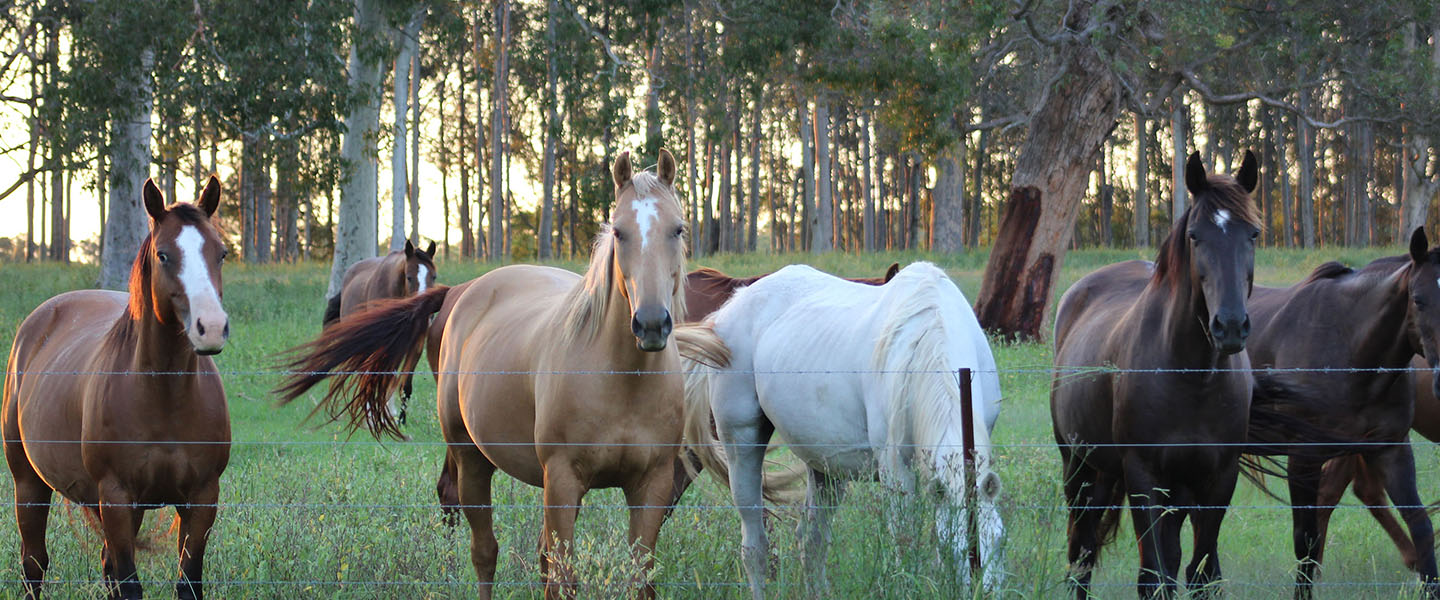About this course
Applications for 2023 have closed. Applications for 2024 are now being accepted.
Deep equine knowledge and thorough practical skills; Tocal’s horse course will set you on the right path for a career in a variety of horse industries.
The course aims to develop knowledge and skills in:
- horse health, breeding, breaking, training, riding, foal and weaner handling
- Farm skills including specialist equine husbandry, pastures & fencing
- WHS, First Aid and AQF3 chemical use accreditation.
At a glance:
| Location: | Paterson campus |
| Course duration: | 1 year full-time |
| Start date: | February - applications close end of October |
| Number of units: | 16 |
| Indicative fees: | Refer to Fees page |

Details
In order to achieve this qualification, students must complete sixteen (16) units made up of two (2) core units and fourteen (14) elective units.
The electives chosen must include:
- a minimum of five (5) competencies from Group A,
- an additional five (5) from Group A or B, and
- a maximum of four (4) Group C units or units from elsewhere in Cert II, III or IV.
You must complete 16 units of study to complete the course. Details of the available units are provided in the Student Handbook.
The horse industry is a large employer in the Hunter and other parts of NSW. Jobs include stable hands, strappers, track riders, stationhands, vet assistants, polo grooms, horse breakers/trainers, and stud work for the thoroughbred and pleasure horse industries.
Some students continue onto the Certificate IV in Agriculture or undertake further studies in horse husbandry at other institutions.
Students must have Year 10 or equivalent. Some students may benefit from completion of Year 12, particularly if intending to progress to further studies. Experience with horses and sound riding ability is required and must be demonstrated during the application process.
One year, full-time.
The course is delivered at Tocal College, which has up-to-date training facilities and equipment, as well as commercial and demonstration farm enterprises including beef, dairy, sheep, horses, poultry and cropping.
Tocal runs over 100 stock horses including a group of brood mares which are used to breed replacements. Foals and yearlings are handled by students, and students break in and train young horses.
Facilities for College horses include horse paddocks and yards, tack room and stables. The College property of 2200 hectares runs up to 1500 beef cattle, and all stock work is done with horses.
Fees are charged for the course studied (including the Smart and Skilled Student Fee), as well as board and lodging (includes room, meals and laundry), tours, student association fees, equipment and resources used in the course. Fees are payable at the start of each term or by fortnightly instalments. Specific information on fees is available on the Course fees page and also in the Student Handbook PDF, 6704.71 KB.
There are a large number of scholarships available for students enrolled at Tocal. Further information about these, and the relevant application forms are available on our Financial Assistance page.
Many students also qualify for Youth Allowance or Abstudy which may allow concessions or exemptions from the NSW Smart and Skilled Student Fee, fortnightly support payments or coverage of other fees (contact Centrelink for more information).
Additional information
For information on students rights and responsibilities, and the Tocal College Code of Practice see Student policies.
Tocal students have the opportunity to complete more than the minimum number of units required at no extra charge. These extra units provide students with a broader range of skills and experience and are based on feedback from industry and the employers of Tocal graduates. Completing these extra units increases a student’s employability skills and industry readiness, making them more desirable to potential employers.
Tocal also has articulation (credit for study at Tocal) arrangements in place with a number of Australian universities. Further information is available on our University pathways page.
Support is available via email, phone, face to face on-campus, and through Canvas (the online learner management system).
Tocal newsletter
Want to find out about news, events, courses and publications?

